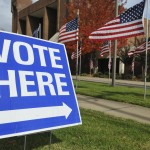CLEVELAND — The ACLU of Ohio, National ACLU, and Dēmos presented arguments today to the Supreme Court in Husted v. A. Philip Randolph Institute, a case focusing on Ohio's practice of purging voters from its registration rolls. The groups argued that the Supplemental Process directly violates the National Voter Registration Act of 1993 (NVRA).
Registrants are targeted for removal from the voter rolls after failing to vote in one election and could ultimately be removed if they do not vote in the following four-year period. The practice erroneously presumes that registrants’ failure to vote over a two-year period means that they have moved. In 2015 alone, hundreds of thousands of voters were removed under Ohio's unlawful purge practice. Many of them arrived at the polls to vote only to learn that they were no longer registered.
The following comments are from:
Freda Levenson, Legal Director, ACLU of Ohio: “Eligible voters should not be purged from the rolls. Period. State-sanctioned obstacles to the ballot box keep certain groups in power over others — and also violate the law.”
Dale Ho, Director, ACLU’s Voting Rights Project: “Knocking eligible voters off the rolls simply because they exercise their right not to vote is illegal. That’s why the Court of Appeals struck down Ohio’s voter purges, and the Supreme Court now has a chance to do the same.”
Paul Smith, Vice President of Litigation, Campaign Legal Center: “Ohio’s process denies eligible individuals their right to vote, attacking the very heart of our democracy. The NVRA allows states to remove a voter’s name from the rolls only if the voter has become ineligible, and it specifically prohibits states from removing infrequent voters.”
Stuart Naifeh, Senior Counsel, Dēmos: “Voting allows for the people of this great nation to have their voices heard. Ohio’s Supplemental Process is an affront to democracy and undermines confidence in our democratic system.”
Chris Knestrick, Executive Director, Northeast Ohio Coalition for the Homeless: “All Americans, regardless of whether or not they have a permanent residence, deserve the opportunity to participate in our democracy. Homeless Americans should have the same rights to partake in our electoral process and have their voices heard.”
Andre Washington, President, Ohio A. Philip Randolph Institute: “Voter purges, like Ohio’s Supplemental Process, disproportionately affect low income voters and voters of color who face countless barriers to casting their ballot. We should be working to make voting easier, not more difficult, for Americans that want to participate in the electoral process.”
More information on Husted v. A. Philip Randolph Institute.
###
Stay Informed
Sign up to be the first to hear about how to take action.
By completing this form, I agree to receive occasional emails per the terms of the ACLU’s privacy statement.
By completing this form, I agree to receive occasional emails per the terms of the ACLU’s privacy statement.

